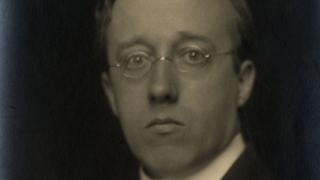 Image copyright
The Holst Birthplace Trust
Image copyright
The Holst Birthplace Trust
Two lost musical scores from Gustav Holst are being hand-delivered to the UK after being found in New Zealand.
The works, which were signed by the renowned composer in 1906, turned up last year some 11,500 miles (18,500 km) from where they were written.
It is not known how the two manuscripts made their way to the Bay of Plenty Symphonia's library, in Tauranga, but it is believed a flautist was involved.
They have been donated to the Holst Birthplace Place museum in Cheltenham.
One of the manuscripts - Folk Songs From Somerset - has never been published and the other - Two Songs Without Words - was presumed to be lost.
They were found during a clear out of the symphonia's sheet music archives. The music director later said they "didn't really believe" they were holding genuine Holst manuscripts.
How they got there is a mystery, but the symphonia staff believe the most compelling theory is that an English flautist named Stanley Farnsworth, who was in New Zealand in the 1960s and conducted an earlier version of the orchestra, may have been involved.
Holst had written the address 31 Grena Road, Richmond - where the composer lived for four years - on the front of one of the scores.
And now the works have been returned to the UK where they are being received later by museum curator Laura Kinnear, in Cheltenham.
"It is extremely rare to find a 'lost' work and so we are very grateful to the Bay of Plenty Symphonia for having a clear out," she said.
"The Bay of Plenty Symphonia and the museum have the same aim, to make these works publically accessible.
"It would have been a tragedy for the manuscripts to end up in a private collection."